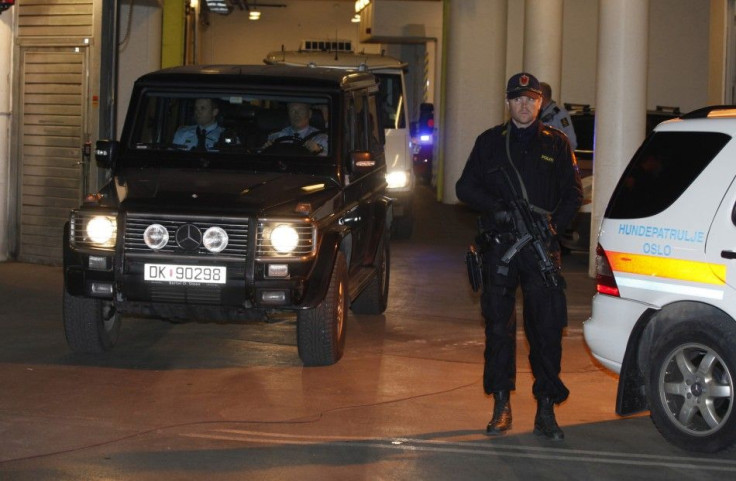Norway mass killer admits July massacre

OSLO (Reuters) - The anti-Muslim militant who killed 77 people in Norway on July 22, shattering a nation known for its open society, acknowledged carrying out the massacre but refused to plead guilty in his first public hearing since the attacks.
Anders Behring Breivik, speaking on Monday at a court just two blocks from where he detonated a huge home-made bomb before shooting 69 people at the ruling Labour Party's summer camp, also rejected the court's authority to hear his case.
I am a military commander in the Norwegian resistance movement and Knights Templar Norway. Regarding the competence (of the court), I object to it because you received your mandate from organizations that support hate ideology (and) because it supports multiculturalism, Breivik told the court.
It was the first time survivors and the families of victim were able to see Breivik face-to-face since the attack on the government and the ruling party for what Breivik said was their promotion of immigration.
Oil-producing Norway, home to the Nobel Peace Prize, is known for its open society, peace and relative prosperity. The attacks sparked a public debate about immigration, security and a legal system which never had to cope with such an event.
I acknowledge the acts but I do not plead guilty, Breivik told the court.
HE AIMED AT ME
Breivik, speaking at a court picketed by a group of protesters holding a banner that read No speakers' platform for fascists, attempted to address survivors and victims' relatives but the court denied his request.
He aimed at me on Utoeya Island. That was the last time I saw him, Bjoern Ihle, 20, from Oslo said after the hearing.
It is good to see he was powerless, which he was not then ... He looked nervous and weakened. It was a different experience than when I saw him at Utoeya.
Most of the island victims were in their teens or 20s, and some were shot at point blank range or while trying to swim to safety.
Daniel Vister, another survivor, said Breivik looked weak and his rant showed he was mentally ill.
I think that what he said there shows that he is completely mad. He is definitely not on this planet.
I didn't think he would look like that ... He was very big then and he now looked so flimsy, he said.
In a rambling manifesto posted on the Internet before the attacks, Breivik wrote that his arrest would open the propaganda phase of his operation to ignite a war to defend Europe against a supposed Muslim takeover.
The hearing, required under Norwegian law to keep a suspect in prison before trial, was Breivik's fourth, and as expected, the court decided to keep him in custody. He will likely remain in prison until he goes to trial, probably in the first half of next year.
About 120 people were admitted to the courtroom, while hundreds of others squeezed into overflow rooms equipped with video links.
Breivik has been kept in solitary confinement since July 22 and has been denied visits, correspondence and access to newspapers and television.
The prosecution asked the court to ease those restrictions slightly on Monday but the judge declined.
(Writing by Balazs Koranyi; Editing by Andrew Heavens)
© Copyright Thomson Reuters 2024. All rights reserved.





















